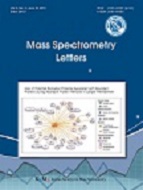
- P-ISSN 2233-4203
- E-ISSN 2093-8950

Bilin tetrapyrroles are metabolic products of the breakdown of porphyrins within a species. In the case of mammals, these bilins are formed by the catabolism of heme and can be utilized as either biomarkers in disease or as an indicator of human waste contamination. Although a small subset of bilin tandem mass spectrometry reports exist, limited data is available in online databases for their fragmentation. The use of fragmentation data is important for metabolomics analyses to determine the identity of compounds detected within a sample. Therefore, in this study, the fragmentation of bilins generated by positive ion mode electro- spray ionization is examined by collision-induced dissociation (CID) as a function of collision energy on an FT-ICR MS. The use of the FT-ICR MS allows for high mass accuracy measurements, and thus the formulas of resultant product ions can be ascertained. Based on our observations, fragmentation behavior for hemin, biliverdin and its dimethyl ester, phycocyanobilin, bilirubin, bilirubin conjugate, mesobilirubin, urobilin, and stercobilin are discussed in the context of the molecular structure and collision energy. This report provides insight into the identification of structures within this class of molecules for untargeted analyses.
Mense, S. M.. (2006). . Cell Res, 16, 681-.
Fahmy, K. (1972). . Biochem. Med, 264, 85-.
Otani, K.. (2001). . J. Surgical Res, 96, 44-.
Cao, H.. (2011). . Anal. Chim. Acta, 691, 68-.
Jones-Lepp, T.. (2006). . J. Environ. Monit, 8, 472-.
Rudolph, H. L.. (2015). . Curr. Trends Mass Spectrom, 13, 28-.
Owings, C. G.. (2018). . J. Environ. Entomol, 47, 586-.
Sekera, E. R.. (2017). . Metabolomics, 13, 132-.
Quinn, K. D.. (2012). . Rapid Commun. Mass Spectrom, 26, 1767-.
Coffey, J. M. (2018). . J. Label Compd. Radiopharm, 61, 742-.
Falk, H.. (1987). . Monatsh. Chem, 18, 813-.
Yang, F.. (2012). . Anal. Chem, 84, 4851-.